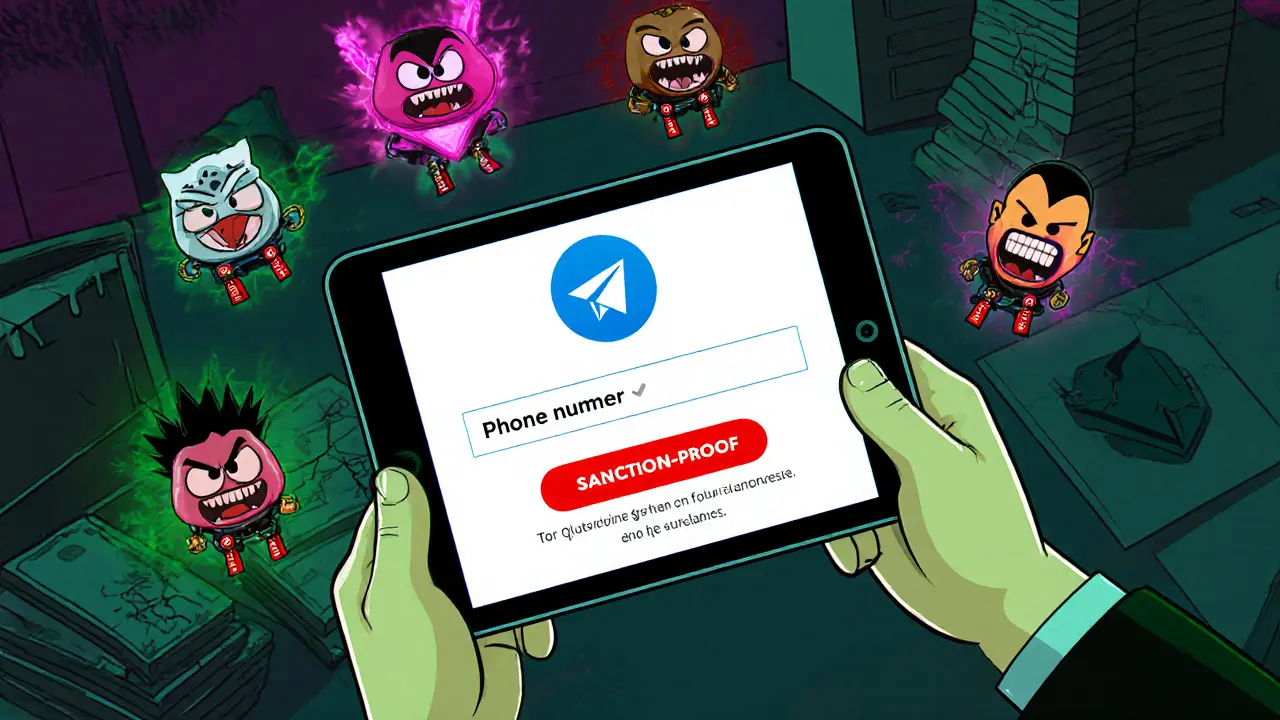Crypto Exchange Risk Assessment Tool
Risk Assessment
This tool helps you determine the risk level of a crypto exchange based on Russian regulatory requirements and sanctions.
Russian crypto enthusiasts face a maze of laws, sanctions and sudden police raids. One wrong platform and you could see your funds frozen, your phone tapped, or even a criminal case opened against you. This guide pinpoints the exchanges that carry the biggest legal and financial danger, explains why the authorities are cracking down, and shows how to stay on the safe side.
Why Russian Users Need Extra Caution
Since Federal Law No. 114‑FZ took effect in January 2021, owning cryptocurrencies is technically allowed, but using them for domestic payments is banned. In mid‑2024 Moscow slipped a loophole that lets crypto be used for international trade, yet the Bank of Russia immediately barred banks from handling crypto‑related flows. The result? A split market where licensed “experimental regime” platforms operate under strict AML reporting, while a shadow network of unlicensed exchanges flies under the radar.
Since October 2024, coordinated raids across more than a dozen regions have seized tens of millions of dollars, rubles and euros from platforms that dodge Russian licensing. The security services now treat the use of unlicensed exchanges as a possible violation of Article193.1 of the Russian Criminal Code, which can lead to fines of up to 1millionrubles or up to seven years in prison for large‑scale offenses.
For a Russian trader, the biggest question is simple: which exchanges are likely to trigger those enforcement actions? Below we list the most dangerous players and why they are on the watch list.
Exchanges Russian Users Should Avoid
The following platforms share three red‑flag traits: no Russian licensing, placement on the U.S. OFAC sanctions list, and a documented history of facilitating illicit transactions.
- Garantex is an offshore‑registered exchange that was designated by the U.S. Treasury’s Office of Foreign Assets Control (OFAC) in April2022 for enabling ransomware payments and sanction evasion. The platform’s successor network, often called “MKAN Coin,” operates via Telegram and requires only a phone number to open an account. In March2025 a global takedown froze millions of dollars and left thousands of Russian users without access to their funds.
- Exved is a payment processor based in Moscow’s International Business Center that masks itself as a legitimate import‑export exchange but routes transactions through offshore entities like Feilian Company Limited in Hong Kong. It processes over 2billionrubles monthly via an Alfa‑Bank conduit, avoiding Rosfinmonitoring’s reporting requirements.
- Grinex is the rebranded successor to Garantex, launched by the same team that built the original platform. Users report sudden account freezes and an average loss of 850000rubles per case after the October2025 server seizure.
- MKAN Coin is a Telegram‑based exchange that advertises "sanction‑proof" transfers and only asks for a passport photo and bank details. Because it lives entirely in encrypted chats, law enforcement finds it hard to trace, but the platform is flagged in the latest Transparency International Russia report for facilitating money‑laundering.
- Alfa‑Bank is one of the few Russian banks that inadvertently became a conduit for offshore crypto transactions when it opened accounts for the Exved network. While the bank itself is licensed, its involvement with unlicensed exchanges places its customers at heightened scrutiny.
Regulatory Enforcement: What Has Happened and What’s Coming
Since the summer of 2024, the Bank of Russia has issued methodological recommendations that mandate “enhanced AML monitoring” for any crypto activity not routed through a licensed experimental‑regime exchange. In October2025, security services seized 37 additional exchange servers across Moscow, targeting platforms that processed crypto payments for dual‑use goods imports.
Internationally, the U.S. Treasury continues to list Garantex and its affiliates on the Specially Designated Nationals (SDN) list. A $5million bounty for information leading to the arrest of Garantex executives underscores the lasting pressure.
Domestically, the State Duma is drafting Bill45876‑8, which would criminalize the use of sanctioned exchanges with fines up to 1millionrubles for first‑time offenders. Analysts at FinVision predict a 90% drop in usage of high‑risk platforms by mid‑2026 as enforcement tightens.

Red Flags to Spot Before You Sign Up
Even if a platform isn’t on the list above, look for these warning signs:
- Only asks for a phone number or a passport photo-no thorough KYC verification.
- Operates primarily on messaging apps (Telegram, Discord) rather than a dedicated website.
- Claims “instant” transfers without mentioning AML checks.
- Has a corporate address in a jurisdiction known for lax regulation (e.g., UAE, Georgia, Hong Kong).
- Is absent from the Bank of Russia’s “experimental regime” registry.
If you see two or more of these, walk away - the short‑term speed isn’t worth the legal exposure.
Safer Alternatives and How to Stay Compliant
Licensed Russian exchanges operating under the experimental regime still exist, though they require you to be an “especially qualified investor” with at least 6millionrubles in assets. These platforms submit full transaction reports to Rosfinmonitoring and comply with the Bank of Russia’s AML guidelines. Examples include:
- CryptoBank - offers fiat‑to‑crypto on‑ramps for corporate users, full KYC, and a dedicated compliance team.
- FinEx - a joint venture between a Russian bank and a global crypto firm, providing transparent reporting.
When you choose a compliant platform, you gain two major protections: your funds are covered by Russian financial regulations, and you have a legal avenue if something goes wrong.
Practical Tips for Protecting Your Crypto in Russia
- Verify licensing. Check the Bank of Russia’s experimental‑regime list before depositing.
- Keep records. Save every transaction receipt, KYC screenshot, and bank statement. If authorities request proof, you’ll be ready.
- Use hardware wallets. Store long‑term holdings offline rather than on an exchange.
- Limit transfer size. Smaller, frequent transfers are less likely to trigger a raid.
- Stay updated. Follow official announcements from the Bank of Russia and Rosfinmonitoring for any rule changes.
Following these steps dramatically reduces the chance of losing your crypto to a sudden freeze or a criminal investigation.

Quick Comparison of High‑Risk Exchanges
| Exchange | Licensing status (Russia) | Sanctions (OFAC/US) | Recent enforcement | Typical verification | Main risk |
|---|---|---|---|---|---|
| Garantex / MKAN Coin | Unlicensed | Designated SDN (2022) | March2025 global takedown, funds frozen | Phone number only | Account seizure, criminal liability |
| Exved | Unlicensed, offshore registration | Linked to SDN entities | Oct2025 server seizure | Passport photo + bank details | Money‑laundering, AML breaches |
| Grinex | Unlicensed | Part of Garantex network | Sep2025 user fund freezes | Phone & basic ID | Loss of funds, no recourse |
| MKAN Coin (Telegram) | Unlicensed | No official OFAC listing but flagged by TI Russia | Ongoing investigations 2024‑2025 | Minimal KYC | Legal exposure, crypto‑laundromats |
Notice how each platform lacks legitimate Russian licensing and either appears on sanctions lists or is tied to entities that have been seized. That combination makes them prime targets for law‑enforcement action.
Bottom Line for Russian Crypto Traders
If you want to keep your crypto safe and stay out of trouble, steer clear of the exchanges listed above, double‑check any platform’s licensing status, and consider moving your holdings to a hardware wallet or a compliant Russian exchange. The short‑term speed of unlicensed services is tempting, but the long‑term cost-frozen accounts, legal battles, or even jail-far outweighs any convenience.
Frequently Asked Questions
Can I use a foreign exchange if I’m a Russian resident?
Only if the exchange is licensed under Russia’s experimental regime and reports transactions to Rosfinmonitoring. Otherwise you risk violating Article193.1 and having your funds frozen.
What happens if my account on a banned exchange gets frozen?
The platform can block withdrawals without notice, and Russian authorities may open a criminal case. You typically have no legal recourse to recover the funds.
Is a hardware wallet enough protection?
A hardware wallet keeps your private keys offline, protecting you from exchange failures. Just remember to back up the seed phrase securely.
How can I verify if an exchange is on the OFAC sanctions list?
Check the U.S. Treasury’s official SDN list or consult a reputable compliance database. If the exchange appears, avoid it completely.
What are the penalties for using a sanctioned exchange?
First‑time offenses can lead to fines up to 1millionrubles under the draft bill, and large‑scale violations may result in up to seven years imprisonment.


Comments
Just stick to CryptoBank or FinEx and you’ll be fine. No drama, no jail time, just smooth sailing. Seriously, why risk it?
I’m so glad someone laid this out so clearly. I’ve seen friends lose everything because they thought ‘it’s just crypto’ and didn’t realize how deep the legal rabbit hole goes. Please, if you’re reading this - verify the license. Always.
Oh wow so now even using crypto is a crime in Russia? Next they’ll ban bicycles because they might be used to escape the police. Classic authoritarian move. I’m not surprised. The state fears freedom more than criminals. Let them freeze my funds - I’ll just move them to the moon
This post is half-right. You missed that Garantex was never even the real problem - it was the Russian banks like Alfa that let the money flow. The entire system is corrupt. The government doesn’t care about AML, they care about control. If you’re not paying them in taxes, you’re a target. Simple.
Biggest tip? Use a hardware wallet. Even if the exchange gets shut down, your keys are yours. And keep screenshots of every KYC step - if they come knocking, you’ve got proof you tried to be legit. Don’t wait till it’s too late.
People still use these sketchy exchanges? Are you kidding me? You think Telegram is safe? You think a passport photo is enough? You’re not a trader - you’re a walking liability. If you can’t follow basic compliance rules, you don’t deserve to hold crypto. This isn’t the Wild West anymore. Get your act together or get out.
Let’s be honest - the entire Russian crypto scene is a joke. You want to trade? Move to Singapore. Or Dubai. Or anywhere with actual rule of law. Staying in Russia and pretending you can outsmart the FSB is like trying to outrun a tank on a bicycle. Pathetic.
Wait… did you notice how Alfa-Bank is listed as a risk? That’s not an accident. This is all a setup. The FSB and the Treasury are working together to seize crypto holdings under the guise of ‘sanctions enforcement’. This isn’t about crime - it’s about wealth confiscation. They’re building a digital Gulag. You think your hardware wallet saves you? Think again. They’ll come for your seed phrase. They always do.
Man I used Garantex back in 2023 and thought I was slick. Then one day - poof. No warning. No email. Just a frozen account and a message saying ‘contact support’ in Russian. I lost 2.3 BTC. I didn’t report it. Why? Because I knew I was playing outside the rules. Don’t be me. Don’t risk your freedom for a few thousand bucks.
Thanks for the list. I just checked and I’ve been using FinEx for six months. Took forever to get verified but worth it. I don’t care about speed - I care about sleeping at night. If you’re not doing KYC, you’re not trading. You’re gambling with your future.
ok so like… what if you just use binance? i mean its not russian right? they dont care about you? or do they? i heard they got a secret deal with moscow now. idk man. i just want to buy btc without getting arrested. this is so confusing
Why are we even discussing this? If you’re a Russian citizen, your only safe option is to avoid crypto entirely. The state owns your digital life now. Any platform you use is a proxy for surveillance. The fact you’re still asking ‘which one is safe’ proves you don’t understand the game. You’re not a trader. You’re a data point.
Compliance isn’t boring - it’s empowerment. When you use a licensed platform, you’re not just avoiding jail, you’re building a legal claim to your assets. That’s power. That’s protection. That’s what separates crypto from chaos.
Everyone’s so scared of losing money but no one talks about how this is destroying families. My cousin got arrested last month for using Grinex. He didn’t even know it was illegal. Now he’s in pre-trial detention. His kid is 5. Who’s gonna pay for his therapy? Who’s gonna fix this?
As someone who has worked with cross-border financial systems for over 15 years, I must emphasize that the legal exposure described here is not merely theoretical. The convergence of OFAC sanctions with Russian criminal code Article 193.1 creates a jurisdictional trap from which there is no legal escape. Any transaction routed through unlicensed intermediaries, regardless of intent, constitutes a material breach under both domestic and extraterritorial law. I urge all users to consult a licensed financial compliance attorney before engaging in any crypto activity.